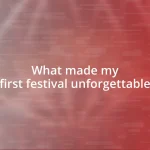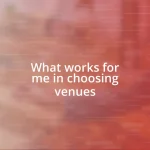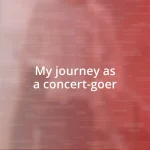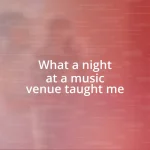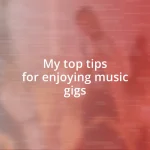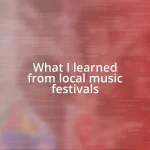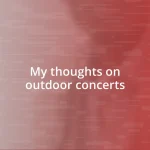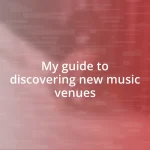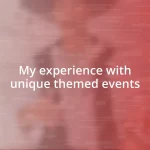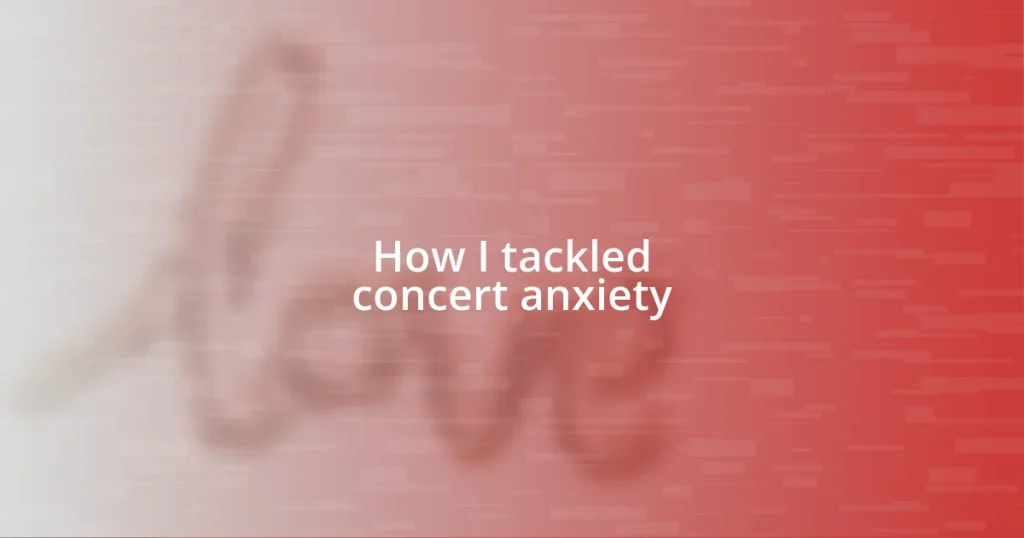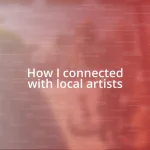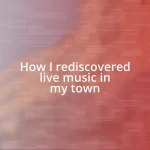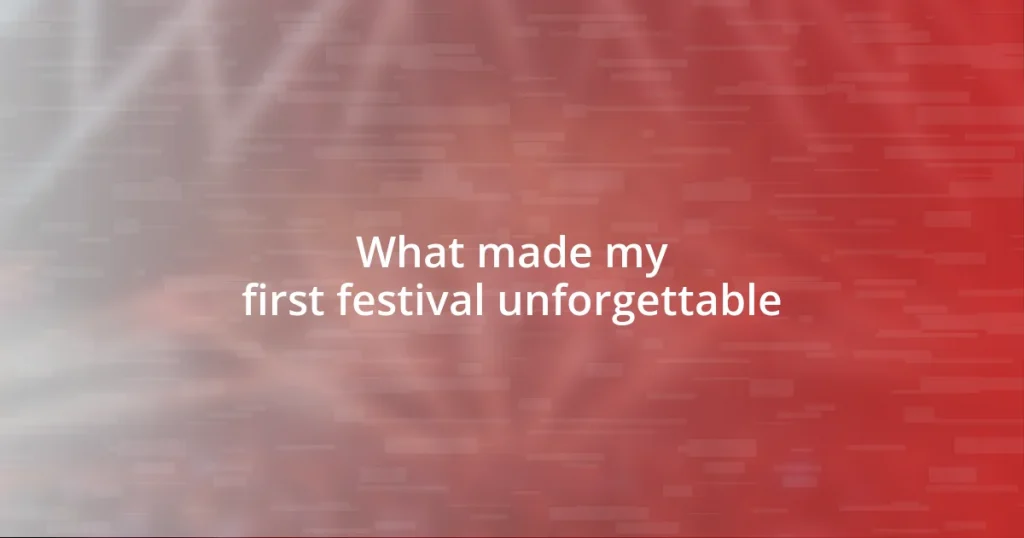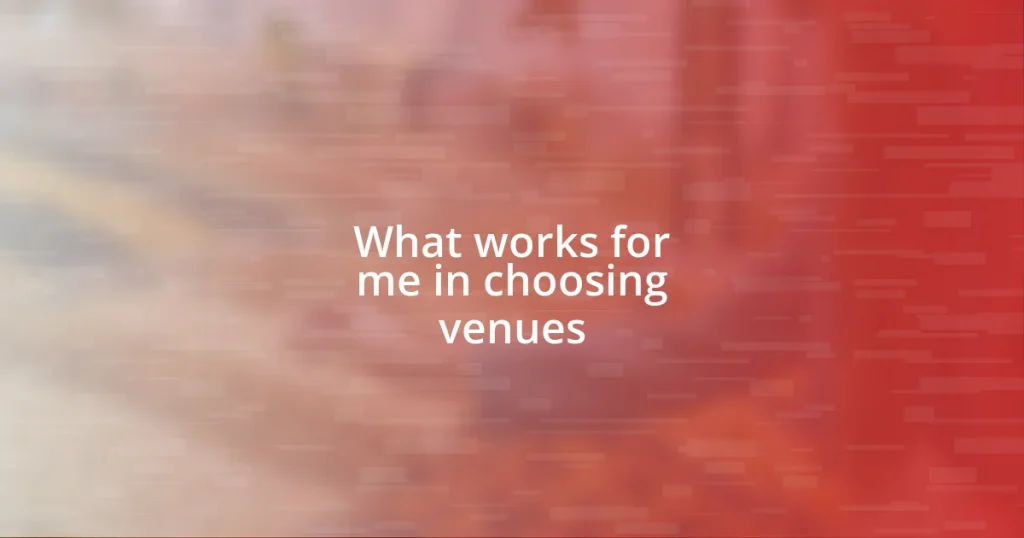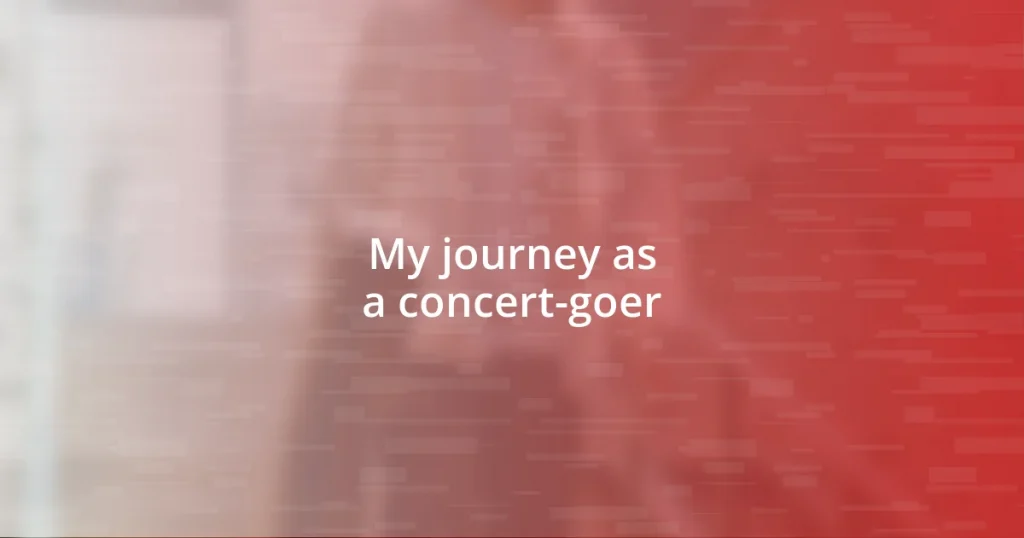Key takeaways:
- Understanding concert anxiety involves recognizing triggers, which can include overthinking, social pressure, and unfamiliar environments.
- Developing a pre-concert routine and practicing relaxation techniques, such as deep breathing and visualization, can significantly reduce anxiety and enhance performance.
- Engaging in positive self-talk and reflecting on the concert experience fosters personal growth and transforms anxiety into connection with the audience.
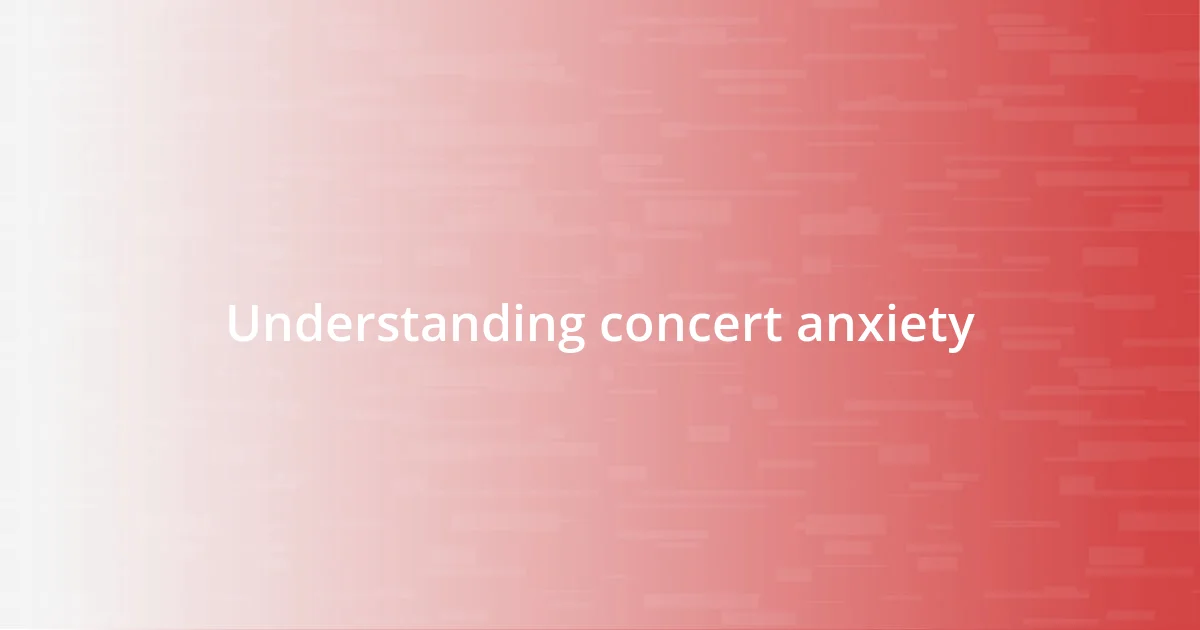
Understanding concert anxiety
Concert anxiety can feel overwhelming, almost like standing on the precipice of a high cliff, ready to jump into the unknown. I remember my first concert; the rush of excitement mingled with a knot in my stomach was palpable. It made me wonder—why do our bodies react this way in situations that are supposed to be fun?
The anticipation of a crowd can trigger a flood of nerves, and for some, it’s almost paralyzing. I’ve felt my heart race just at the thought of performing, worrying about what could go wrong. Have you ever found yourself dreading what might happen on stage, even when you know you’ve prepared? It’s in these moments that I realized my anxiety stemmed not just from fear of failure, but also from the pressure of wanting to connect with the audience.
As I delved deeper into understanding my anxiety, I discovered it often rooted in fear of judgment and vulnerability. There was that one concert, where my hands shook so much, I could barely strum my guitar. But in that vulnerability, I found an unexpected strength. If I could feel all those emotions, surely, others in the audience felt them too—binding us in shared humanity. Isn’t that what music is all about?
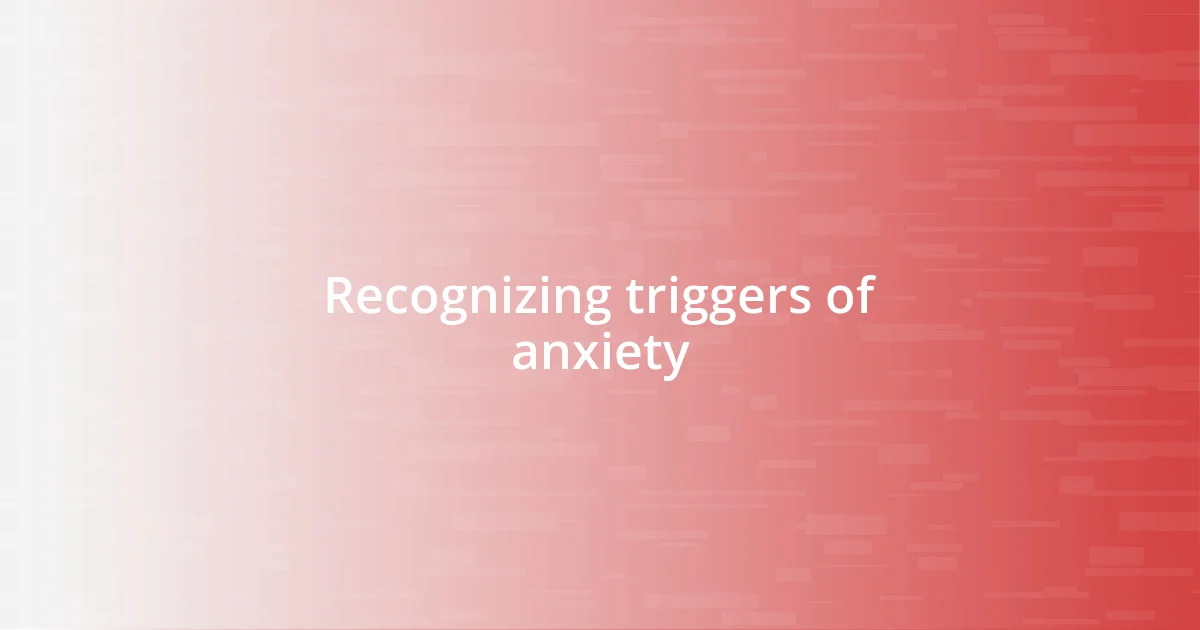
Recognizing triggers of anxiety
Recognizing what triggers anxiety is crucial for managing those overwhelming feelings. I often noticed that specific situations, like a tightly packed venue or unfamiliar faces, heightened my anxiety levels. It’s not just the event; it’s also about my perception of it. For instance, while performing, I realized that even harmless comments about my music could send my heart racing, as I feared how they might judge my abilities.
Here are some common triggers that I’ve recognized in myself and others:
- Overthinking my performance and anticipating what could go wrong.
- The pressure of social expectations, such as impressing friends or family.
- Unfamiliar environments, like different stages or venues that feel intimidating.
- Negative past experiences, where things didn’t go as planned.
- Sensory overload from loud noises or bright lights that disrupt my focus.
By pinpointing these triggers, I learned to prepare mentally and emotionally, enabling me to engage more fully with the experience rather than succumb to anxiety.
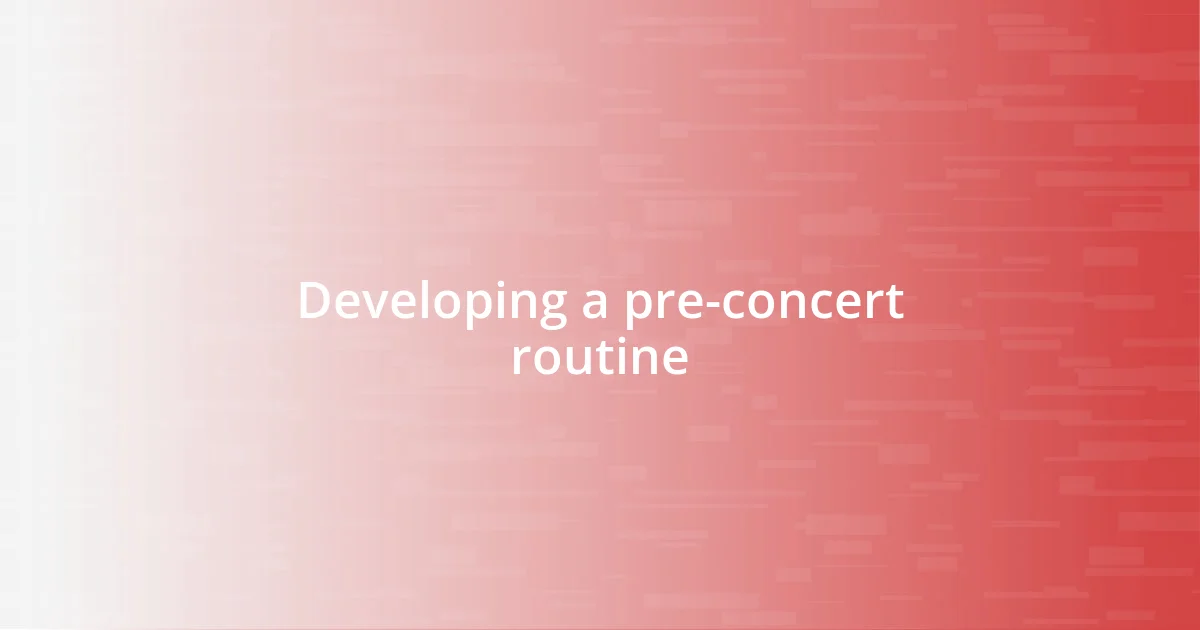
Developing a pre-concert routine
Developing a pre-concert routine has been a game-changer for me. I found that incorporating calming rituals before stepping onto the stage reduces my anxiety levels significantly. Things like breathing exercises or even a quick chat with friends help ground me. I remember one evening, I took a moment backstage to visualize my performance, imagining every note and receiving applause. It made me feel connected to my audience before I even started.
Interestingly, I’ve also discovered that a consistent routine brings a sense of control. Setting specific actions, such as warming up with my instrument or even stretching, helps ease my mind. On one occasion, I forgot my warm-up and felt out of sorts; that night was more nerve-wracking than others. So, I began to treat my pre-concert time as sacred, almost like a ritual to mentally prepare myself for the performance.
I encourage you to experiment and find what works for you. Is there a song you love to listen to beforehand, or perhaps a positive mantra you can repeat? Each little action contributes to creating a comfort zone that makes those butterflies less daunting. It’s all about developing a pre-concert routine that resonates with you, transforming anxiety into anticipation.
| Routine Activity | Impact on Anxiety |
|---|---|
| Breathing Exercises | Calm nerves and increase focus |
| Warm-Up with Instrument | Build confidence and ease muscle tension |
| Visualization | Foster a sense of connection with audience and performance |
| Positive Affirmations | Boost self-esteem and alleviate self-doubt |
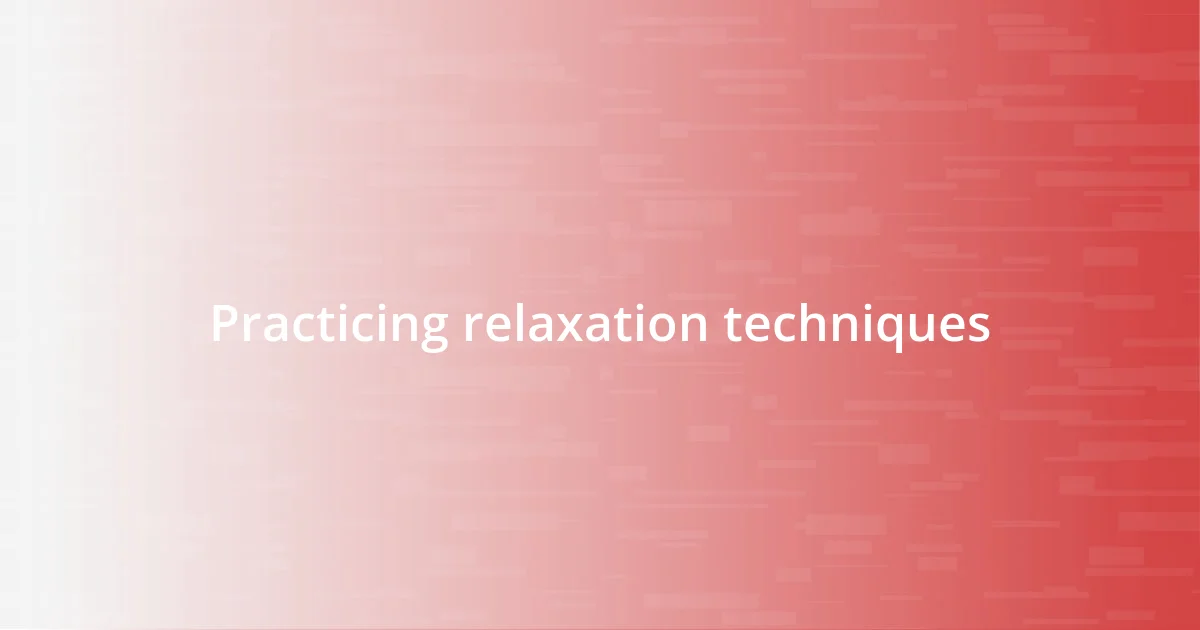
Practicing relaxation techniques
Practicing relaxation techniques has become an essential part of how I navigate my concert anxiety. One technique I rely heavily on is deep breathing. It may sound simple, but taking a few moments to inhale deeply and exhale slowly can truly work wonders. I remember one nerve-wracking night before a big performance; I popped in my earbuds and focused entirely on my breath. It felt like I was crafting my own serene bubble amid the chaos.
Mindfulness meditation is another technique that has brought me peace. I often set aside a few minutes to sit quietly and observe my thoughts without judgment. This practice taught me to let go of the overwhelming urge to control every detail of my performance. Surprisingly, what I notice now is how much calmer I feel, almost as if I’m training my mind to ride the wave of anxiety instead of being swept away by it. Have you ever sat in silence, allowing your thoughts to drift? It’s a cozy space where anxiety loses its power.
I also found that progressive muscle relaxation can be a game-changer. Tensing and then relaxing each muscle group helps release built-up tension. One time, I tried this technique right before stepping onto the stage, focusing on my hands and shoulders, which often hold a lot of my anxiety. The lingering feeling of relaxation stayed with me throughout my performance, reminding me that it’s okay to be nervous, but I have tools to manage it. What relaxation techniques resonate with you? Finding what works best for you can be a pivotal step in transforming anxiety into performance clarity.
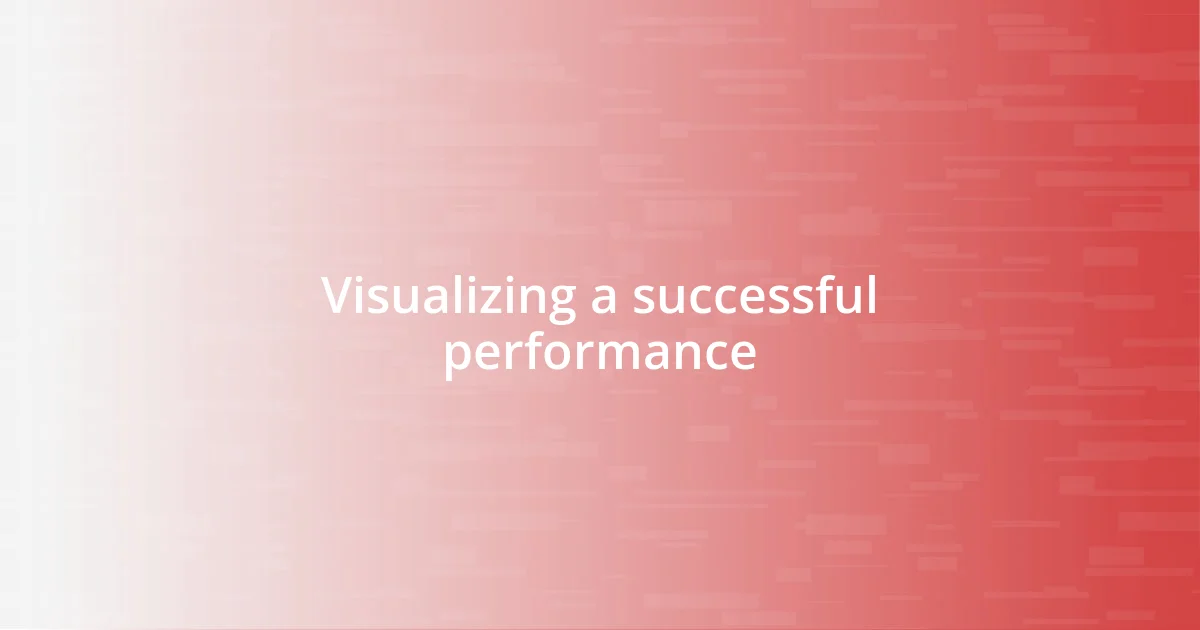
Visualizing a successful performance
Visualizing a successful performance has been a game changer in my approach to concert anxiety. Before a show, I close my eyes and picture myself on stage, fully immersed in the music. I imagine every note flowing effortlessly, the audience swaying, and the applause rising as I finish. It’s a vivid scene, one that fills me with a sense of accomplishment, almost as if I’ve already done it successfully.
One particularly memorable moment was during a pivotal concert where nerves threatened to take over. I stood in front of the mirror backstage, taking a deep breath, and visualized the performance exactly as I wanted it to unfold. I saw my hands dancing across the instrument, the audience smiling, completely engaged. That mental imagery grounded me and transformed anxiety into excitement. Have you ever taken a moment to mentally rehearse something? It’s truly incredible how our minds can set the stage for tangible success.
I’ve also learned that the power of visualization is not just a trick; it’s a strategy that creates a mental blueprint for what I want to achieve. I remember a time when I was feeling particularly anxious about a solo. Instead of succumbing to fear, I visualized the entire performance, complete with how I wanted my energy to feel and the expressions I hoped to see from the audience. When the moment arrived, I realized I was not just performing music; I was sharing a piece of myself with that audience. It’s amazing how connecting those visualizations can lead to genuine joy during the performance!
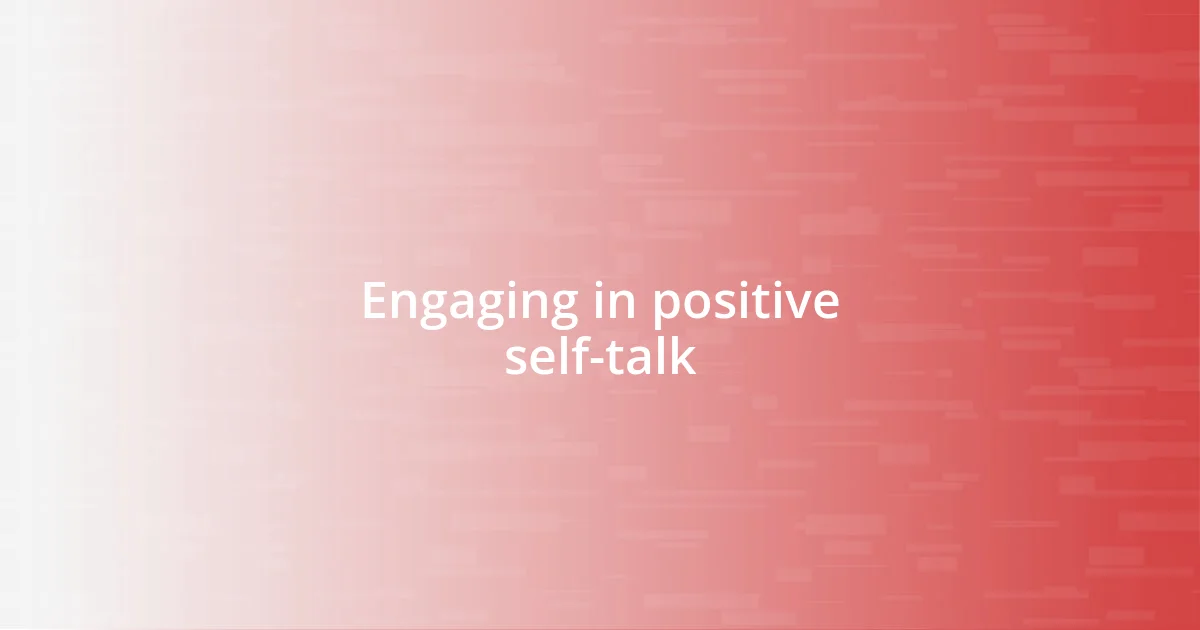
Engaging in positive self-talk
Engaging in positive self-talk has been one of the most transformative tools in my journey through concert anxiety. I often find myself whispering affirmations like “I am prepared; I am confident” before stepping on stage. These little mantras might seem simplistic, but they genuinely help shift my mindset, allowing me to drown out the negative thoughts that creep in just before a performance. Have you ever tried talking to yourself like you would to a friend? It’s an eye-opening experience to realize we hold so much power in our words.
There was a time when I stood backstage, heart racing and palms clammy, feeling like I could crumble at any moment. In that critical moment, I recalled a mantra I had been practicing: “This is my moment to shine.” I said it softly to myself a few times, feeling the anxiety start to dissipate. It was as if those simple words were a warm hug that wrapped around my racing thoughts, reminding me of my passion and dedication. Have you ever needed a push from within to remind you of your strength? That’s exactly what positive self-talk does—it reaffirms my abilities and brings me back to a centered place.
Over time, I’ve learned to catch those negative self-thoughts early, almost like a game. If I sense any negative vibes creeping in, I counter them instantly with something uplifting. For example, instead of thinking, “What if I mess up?” I flip it to, “I am going to deliver my best performance.” That switch transforms my outlook, and I’ve noticed that when I affirm my capabilities, I perform with more joy and less fear. Isn’t it fascinating how our internal dialogues can shape our reality? I can testify that positive self-talk creates an encouragement cycle, feeding my confidence and fueling my passion for performance.
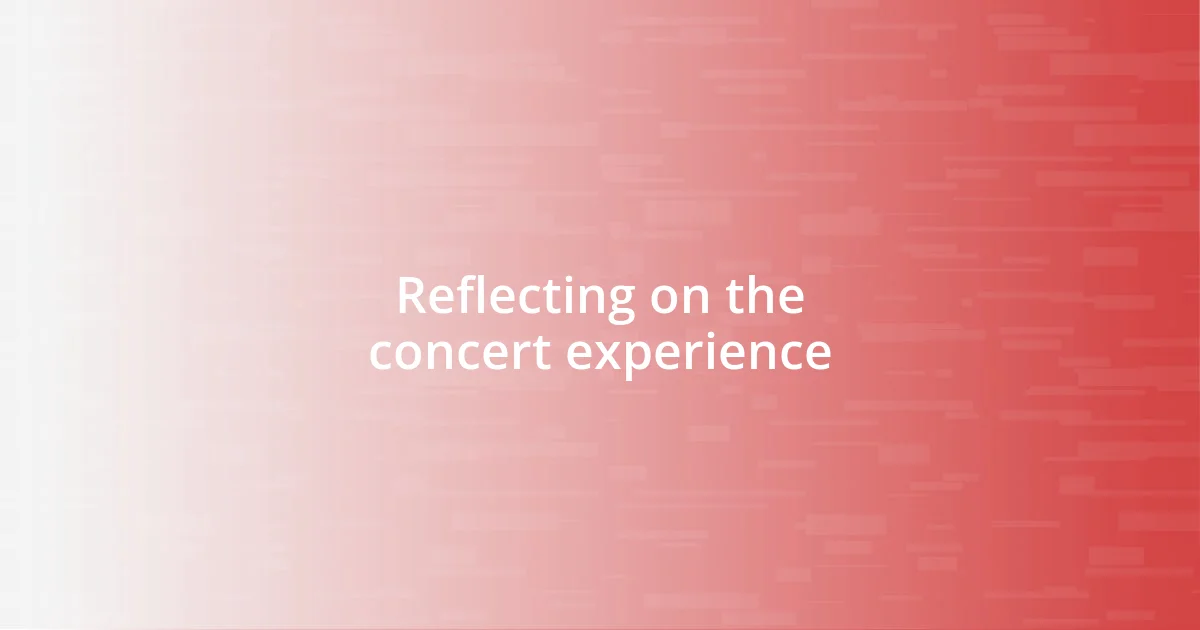
Reflecting on the concert experience
Reflecting on the concert experience often leads me to profound realizations about my journey. After performing, I take a moment to soak in the applause and the energy of the crowd—it’s a rush unlike any other. I vividly remember a time when I stepped off stage, windswept and revved up, thinking, “Did I really just share a piece of my soul with all those people?” That feeling of connection is what keeps me going, even when the nerves threaten to derail me before a performance.
Looking back, I see how every concert is a unique experience, a blend of exhilaration and vulnerability. There was one particular show where I felt an overwhelming surge of joy as I locked eyes with an audience member who was singing along. It struck me that every show is another opportunity to connect, not just with the music, but with others who appreciate it. Have you ever noticed how a shared experience can transform fear into excitement? It’s that magic that makes all the prep worth it.
As I reflect on my performances, I often think about how much I grow from each concert. The thrill of pushing through anxiety and delivering a heartfelt show reminds me to celebrate not just the success, but the process itself. Each time I walk away with lessons learned, whether it’s conquering a tricky piece or embracing the spontaneity of live music. Isn’t it interesting how our perceptions of success can shift so dramatically? For me, it’s less about perfection and more about the connection and growth that each concert brings into my life.
